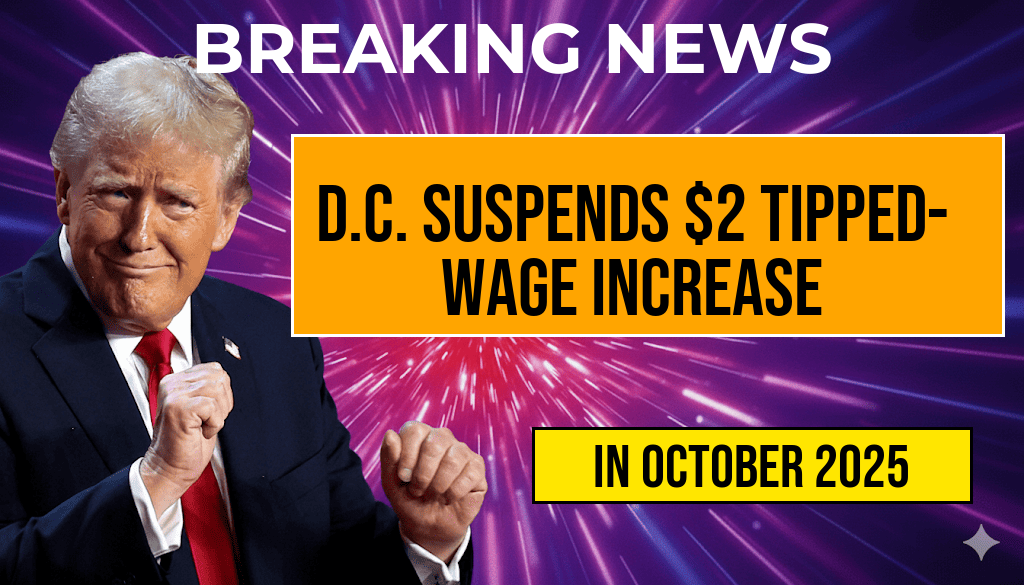District of Columbia Halts $2 Tipped-Wage Increase, Potentially Reducing Servers’ Annual Earnings by Over $4,000
The District of Columbia has paused plans to implement a scheduled $2 increase in the tipped minimum wage, a move that could significantly impact restaurant workers’ income. Originally set to take effect this year, the increase aimed to gradually raise the tipped wage to better align with the federal minimum. However, recent legislative actions and budget considerations have led to the suspension of this increase, potentially costing tipped workers up to $4,160 annually in additional earnings. The decision has sparked debate among hospitality industry stakeholders and labor advocates, who express concerns over the financial stability of servers and bartenders. Meanwhile, policymakers balance competing priorities of economic recovery, budget constraints, and labor protections amid ongoing discussions about wage fairness and industry sustainability.
Background of the Tipped Wage Policy in D.C.
The District of Columbia’s tipped wage policy is governed by local legislation that sets the minimum amount servers can earn per hour, excluding tips. Historically, D.C. has maintained a lower tipped minimum wage compared to the standard minimum wage, under the premise that tips would compensate for the difference. As of 2023, the tipped minimum wage in D.C. was $5.35 per hour, with plans to incrementally increase it to align more closely with the regular minimum wage, which was $16.10 at the time.
The scheduled $2 increase was part of a broader effort to phase out the disparity between tipped and non-tipped wages, aiming to enhance income security for tipped workers and reduce reliance on customer tips, which can be unpredictable. Advocates argued that raising the tipped minimum wage would help address income inequality and improve working conditions, especially given the increased demand for service industry jobs post-pandemic.
Legislative Changes and Budget Constraints
Recently, the D.C. Council’s decision to suspend the wage increase stems from a combination of fiscal pressures and political negotiations. The city faces a tight budget amid economic uncertainty, prompting lawmakers to prioritize essential services and fiscal responsibility. As part of the revised budget, the scheduled $2 bump in the tipped minimum wage was deferred indefinitely.
City officials cited concerns about the potential economic impact on small businesses and the hospitality sector, which has struggled to recover fully from pandemic-related disruptions. Some legislators also expressed reservations about raising wages without comprehensive measures to support small businesses that may face higher labor costs.
Impact on Servers and Industry Stakeholders
| Scenario | Hourly Wage | Annual Estimated Earnings |
|---|---|---|
| Original Plan (with $2 increase) | $7.35 | $4,160 |
| Current Wage (without increase) | $5.35 | $2,880 |
According to industry estimates, servers and bartenders in D.C. could lose up to $1,280 annually, or approximately 31%, in earnings if the wage increase is not implemented. For full-time workers, this reduction translates into less disposable income, potentially affecting their ability to cover living expenses.
Restaurant owners and hospitality groups have expressed mixed reactions. Some argue that the postponement offers relief to businesses still recovering financially, while others warn that wage stagnation could exacerbate staffing shortages and diminish job quality. Labor advocates contend that the move undermines efforts to promote fair wages and could widen income disparities among service industry workers.
Broader Context and Future Outlook
The suspension of the tipped-wage increase in D.C. reflects a broader national debate over minimum wage policies and worker protections. Several states and cities are grappling with similar issues, balancing economic recovery with fair compensation. According to the Wikipedia entry on minimum wage in the U.S., many jurisdictions are reconsidering phased increases amid fiscal challenges and labor market shifts.
Looking ahead, stakeholders anticipate ongoing discussions within the D.C. Council about the wage policy’s future. Some officials and advocacy groups are calling for a reassessment, emphasizing the importance of ensuring that tipped workers receive a living wage regardless of tip variability. Meanwhile, industry representatives push for flexible approaches that consider economic realities and support small business sustainability.
Conclusion
The decision to suspend the $2 tipped-wage increase in D.C. underscores the complex dynamics at play in setting fair labor standards amid economic uncertainties. For servers and bartenders, this decision may mean a tangible reduction in annual income, highlighting the ongoing tension between wage equity and economic resilience. As discussions continue, the outcome will likely influence the future trajectory of tipped wages and labor policies in the nation’s capital and beyond.
Frequently Asked Questions
What is the main change in Washington D.C.’s tipped-wage policy?
The Washington D.C. government has suspended the planned $2 increase to the tipped minimum wage, which could significantly impact servers’ earnings.
How much could servers potentially lose annually due to this wage suspension?
Servers could potentially lose up to $4,160 annually compared to the original plan that included the $2 wage increase.
Why was the $2 tipped-wage increase originally scheduled?
The increase was part of a phase-in plan aimed at gradually raising the tipped minimum wage to ensure fairer compensation for service workers.
What are the reasons behind the suspension of the wage increase?
The suspension was due to budget considerations and economic concerns, which led authorities to delay the wage adjustment to manage financial priorities.
How might this change affect servers and service industry workers in D.C.?
The halt in the wage increase could result in lower earnings for servers, potentially impacting their income stability and overall compensation.

Leave a Reply